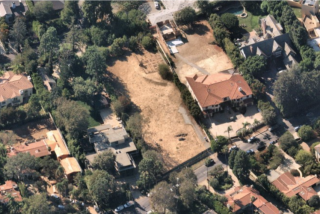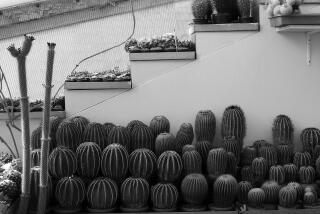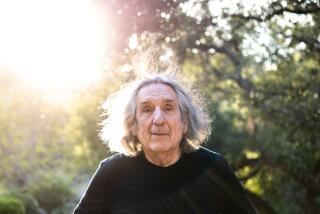The rubber jungle
- Share via
IN May 1873, when Britannia ruled the waves and much else besides, the British Foreign Office issued orders “to take steps to obtain a supply of the seed of the Hevea,” the Hevea brasiliensis being the form of rubber tree that, it was thought, could most easily be propagated. The idea was that the seeds would be taken from the depths of the Amazon rain forest, their point of origin, and sent first to the Royal Botanic Gardens, Kew, “to be raised there with a view of sending the young plants to India.”
So begins the fulcrum episode in Joe Jackson’s “The Thief at the End of the World,” a book that combines broad historical sweep with the dark story of the fascinating, nearly forgotten Henry Wickham, a tragic adventurer who could have come straight from the pages of Joseph Conrad, a real-life “Fitzcarraldo.” The British needed rubber because it enabled so much else -- electricity, machinery, waterproofing, bicycles and (soon) automobiles. It was the era’s key resource, but the British lacked a supply because pretty much the entire world output came from the area around Manaus, Brazil, a region, irritatingly for the British, not under British control.
Jackson gives us an excellent portrait of Joseph Dalton Hooker, director of the Kew gardens, a walking encyclopedia of botany and in some ways the scheming mastermind of this story. Hooker, a prickly, arrogant and duplicitous man, raged against tourists who came stomping around his gardens; he saw Kew as a scientific research and development factory designed to aid Britain’s vast colonial plantations by shuffling plants around the world when opportunities presented themselves.
Kew officials had committed “bio-piracy” before, Jackson contends, with a secret 1860 mission to the heights of the Ecuadorean Andes to procure the seeds and plants of the tree containing life-saving quinine, the first effective treatment for malaria, killer of so many intrepid imperial travelers. Kew’s prestige had skyrocketed as a result, and, with the hevea plot, Hooker sought another triumph. The British had been trying to grow rubber for years; one man had even stuffed a batch of seeds inside a pair of dead crocodiles, but the sensitive seeds didn’t sprout once they got back to England. Determined to try again, Hooker was told of a “Mr. Wickham, at Santarem, who may do the job.” Hooker sent Wickham a letter.
At the time, Jackson has established, Wickham was a serial failure about to celebrate his 37th birthday. He was born in the suburbs of London, the child of middle-class parents. His lawyer father died when Henry was 4. Henry quickly caught the exploring bug, this being Victorian England, where to be a successful explorer was the dream of many a boy -- today’s equivalent of being a rock star. The adventures of John Hanning Speke and Richard Burton in Africa in the mid-1800s started the phenomenon. “Suddenly the explorer was a central hero in the escape fantasy that gripped the British Isles, a champion who trod the earth’s wild places and interpreted what he saw through English eyes,” Jackson writes.
Wickham was 20, a tall, lean man, when he first sailed for the Mosquito Coast of Nicaragua. There he lived in the jungle with an Indian tribe, shooting and skinning birds, intending to send back the exotic plumage to his mother for her millinery business. This harebrained scheme was the first of many that didn’t work out. A subsequent expedition brought Wickham to the Amazon and then to Manaus, where the jungle addict became rubber mad, filled with visions of wealth and success as a plantation owner.
Wickham almost died of malaria but made it back to Britain, where he published a book. He married Violet Carter and, filled with energy, returned to Brazil, taking her with him and also dragging along various other family members to share his dream. There his mother and sister succumbed to malaria and died. Swinging between depression and mania, Wickham seemed set to stumble once more when the fateful hand of Kew, in the shape of Hooker’s letter, descended upon his shoulder.
For this one time, Wickham’s life worked like a charm. He and his wife eventually gathered 70,000 seeds and got them to the Amazon River, where amazingly an ocean liner was waiting, its captain short of cargo. Wickham chartered it on behalf of the British government and spirited the seeds to England, where he woke up the astonished Hooker by slinging stones at his bedroom window. The wheels of power began to turn: A train was chartered and the seeds taken to Kew, where they were planted in an enormous greenhouse. There, attended by a fretful Wickham, rubber plants began to grow, dooming the belle epoque of Manaus and ensuring within decades Britain’s control a key strategic resource -- and the booming world rubber market.
Wickham was paid 700 pounds for the seeds, a decent sum at the time but no life-transforming fortune. Hooker didn’t trust Wickham or much like him -- class probably came into it. He saw to it that Wickham was dropped like a stone, forced to revert to a life of roaming adventure. Wickham’s intrepid wife finally deserted him when she realized he would never stop tilting at windmills in the world’s worst places.
It’s a fabulous story, well told, with excerpts from Wickham’s own writings and Violet’s memoirs. Jackson is especially good on the magical and dangerous nature of jungle and forest. “One entered this verdancy and vanished; you stepped off the path and density closed behind you. As if civilization had never been considered, not even a gleam in God’s eye. Only the forest mattered, the sole reality since the beginning of time,” he writes. Plentiful supplies of deadly bugs, parasites and snakes get the author’s juices flowing too, and he rarely sees a detour he doesn’t take. This has the effect of slowing the velocity, and perhaps lessening the impact, of Wickham’s obsessed journey, although the reader learns much along the way -- about Henry Ford’s attempt to gain a piece of the rubber supply, about malaria, about Charles Goodyear, about Kew, the Donner party and Lansford Hastings (author of guides to California and Oregon and, later, “The Emigrants’ Guide to Brazil”), about the Amazon, the wonders of the rain forest and the rationale of imperial Great Britain.
Jackson, an American, gets at something fascinating about Victorian England: how deep scholarship and daring were yoked to ruthless expansionism, a quest to control pretty much everything. And he never fails to point out present-day comparisons. But the book works best when we’re with Wickham, chasing his El Dorados. In time, those rubber seeds made billions, yet he was always broke. He did live long enough to become Sir Henry Wickham, a sort of vindication, and he sat in colonial clubs, twirling his whiskers and tweaking his tales. “But once seduced, one was never free,” Jackson points out, noting that Wickham never really gave up on his manias. The jungle robbed him of his judgment, and that’s why this story moves and haunts. Perhaps man can’t, in the end, control nature; he can’t even control himself.
More to Read
Sign up for The Wild
We’ll help you find the best places to hike, bike and run, as well as the perfect silent spots for meditation and yoga.
You may occasionally receive promotional content from the Los Angeles Times.






